AI-Driven Personalization in Customer Service Demystified

AI-driven customer engagement in customer service tailors interactions to meet the unique needs of each customer. It uses advanced technologies like artificial intelligence to analyze data and deliver customized experiences. This approach helps businesses understand their customers better, as 62% of respondents confirm that AI enhances buyer understanding. Additionally, 73% of shoppers expect brands to recognize their preferences, showcasing the growing demand for personalized support.
Personalization powered by AI transforms how you engage with customers. Over 90% of organizations now explore AI to enhance customer interactions. By leveraging tools like Sobot’s solutions, businesses can deliver tailored experiences that boost satisfaction and loyalty.
What Is AI-Driven Personalization in Customer Service?
Definition and Core Principles of AI-Driven Personalization
AI-driven personalization in customer service refers to the use of artificial intelligence to tailor interactions based on individual customer preferences, behaviors, and needs. It relies on analyzing customer data to create unique experiences that resonate with each person. This approach ensures that every interaction feels relevant and meaningful, fostering stronger connections between businesses and their customers.
The core principles of AI-driven personalization include:
- Customer-Centricity: Placing the customer at the heart of every interaction by understanding their preferences and expectations.
- Data-Driven Insights: Leveraging customer data to identify patterns and trends that inform personalized strategies.
- Real-Time Adaptability: Using AI to adjust interactions dynamically based on real-time customer behavior.
For example, AI can analyze past purchases, browsing history, and feedback to recommend products or services that align with a customer's interests. This level of personalization not only enhances the customer experience but also drives business growth.
Why Personalization Is Essential for Modern Customer Service
Personalization has become a cornerstone of effective customer service. Modern consumers expect brands to recognize their unique needs and provide tailored solutions. Meeting these expectations can significantly impact customer satisfaction and loyalty.
Here are some compelling statistics that highlight the importance of personalization:
- 91% of consumers prefer shopping with brands that remember their preferences.
- 40% of consumers make more purchases due to personalized website experiences.
- Businesses excelling in personalization achieve 40% higher revenue compared to competitors.
Moreover, personalization simplifies the shopping process. For instance, 59% of consumers find it easier to shop when they receive personalized recommendations. On the flip side, 76% express frustration when a brand's website lacks personalization. These insights underscore the critical role of personalization in meeting customer expectations and enhancing their overall experience.
The Role of AI in Enabling Customer-Centric Personalization
AI plays a pivotal role in delivering customer-centric personalization. It empowers businesses to analyze vast amounts of customer data quickly and accurately, enabling them to anticipate needs and provide tailored solutions. AI-driven tools, such as chatbots and recommendation engines, enhance the efficiency and effectiveness of customer interactions.
The following table illustrates how AI contributes to customer-centric personalization:
| Metric | Description |
|---|---|
| Improved Response Times | AI provides insights to customer service representatives before conversations begin, enhancing efficiency. |
| Streamlined Operations | Customer feedback is analyzed efficiently, allowing teams to focus on actionable strategies. |
| Real-Time Analytics | Processes data as it is generated, enabling immediate insights and proactive customer service. |
AI also leverages historical data to predict future customer behavior. For example, it can identify patterns that signal potential churn and enable preemptive actions to retain customers. Additionally, AI provides real-time insights during live interactions, alerting agents to opportunities for upselling or resolving issues proactively.

By integrating AI into customer service, businesses can deliver personalized experiences at scale. This not only improves customer satisfaction but also drives revenue growth. For instance, companies with excellent customer experiences grow 4%-8% faster than their competitors. As AI technology continues to evolve, its role in enabling customer-centric personalization will only become more significant.
How AI-Driven Personalization Works in Customer Service
Data Collection and Analysis for Personalized Experiences
AI-driven personalization begins with collecting and analyzing customer data. This process helps you understand your customers' preferences, behaviors, and needs. By gathering data from various sources, such as purchase history, browsing patterns, and feedback, AI creates a foundation for delivering personalized experiences.
To ensure effective data collection, businesses often focus on key metrics, including:
- Average order value (AOV) to compare personalized and generic shopping experiences.
- Customer lifetime value (CLV) to track repeat purchases and retention rates.
- Engagement metrics like time on site, pages per session, and bounce rates.
- Customer surveys to gather direct feedback on personalization efforts.
- Unstructured feedback from reviews and social media to gauge customer sentiment.
Tip: Regularly monitor and refine your data collection strategies to maintain accuracy and reliability. This ensures your personalization efforts remain effective.
AI analyzes this data to identify patterns and trends. For example, it can detect which products customers frequently buy together or predict when they might need a refill. These insights enable you to offer personalized recommendations that align with their preferences.
Real-Time Personalization Through AI Algorithms
Real-time personalization allows you to adapt interactions instantly based on customer behavior. AI algorithms process data as it is generated, enabling you to respond to customer needs without delay. This approach enhances the customer experience by making every interaction relevant and timely.
For instance, AI can analyze a customer's browsing activity on your website and recommend products they are likely to purchase. This not only simplifies their shopping journey but also increases the chances of conversion. Businesses that implement real-time personalization often see significant improvements in response time and accuracy.
| Evidence Description | Improvement Rate | Source |
|---|---|---|
| 3x increase in customer response rates | 300% | Harvard Business Review, 2021 |
| 5x faster market responsiveness | 500% | Forrester, 2022 |
| 37% higher marketing campaign response rate | 37% | Aberdeen Group, 2022 |
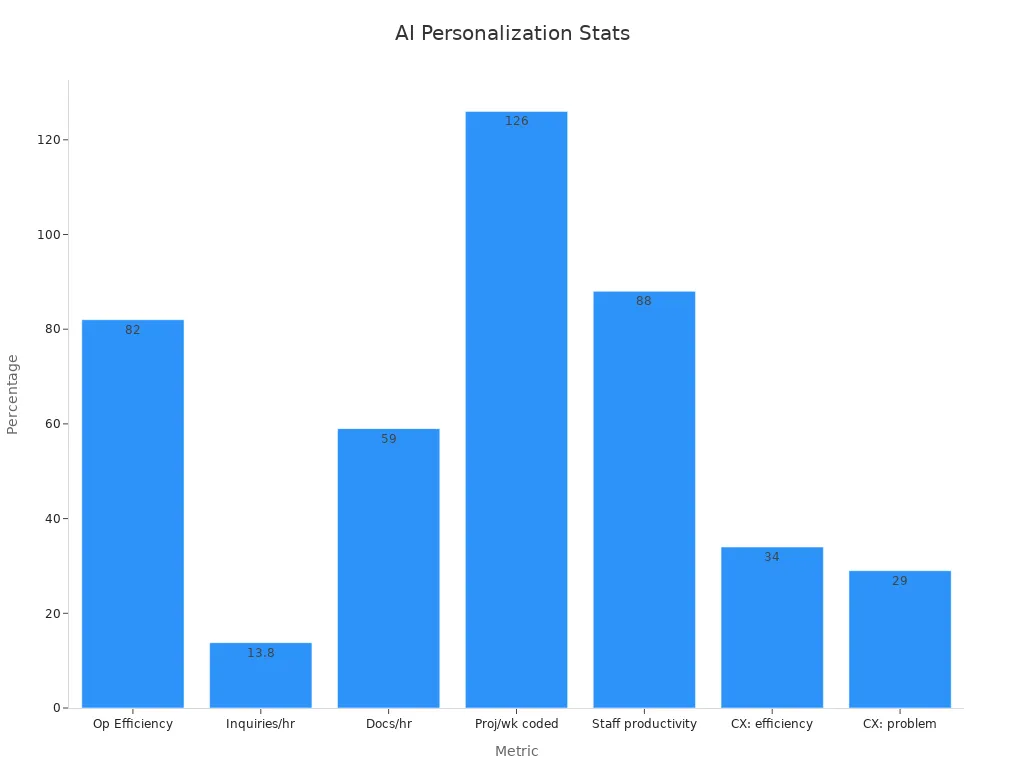
Real-time personalization also boosts operational efficiency. AI tools help customer service agents handle more inquiries per hour by providing instant insights and suggestions. This ensures that your team can focus on delivering high-quality support.
Predictive Analytics and Customer Behavior Forecasting
Predictive analytics uses AI to forecast customer behavior based on historical data. This helps you anticipate customer needs and take proactive steps to meet them. For example, AI can identify customers who are likely to churn and suggest strategies to retain them.
Common predictive techniques include:
- Regression analysis to predict continuous outcomes, such as future sales.
- Classification models to identify customers who might stop using your services.
- Time series analysis to forecast trends, like seasonal demand for specific products.
These methods enable you to make data-driven decisions that improve customer satisfaction and loyalty. For instance, by analyzing past purchases, AI can recommend products that align with a customer's preferences. This not only enhances their experience but also increases the likelihood of repeat business.
Note: Predictive analytics is most effective when combined with real-time personalization. Together, they create a seamless customer journey that feels intuitive and engaging.
How Sobot Live Chat enhances AI-driven customer engagement.
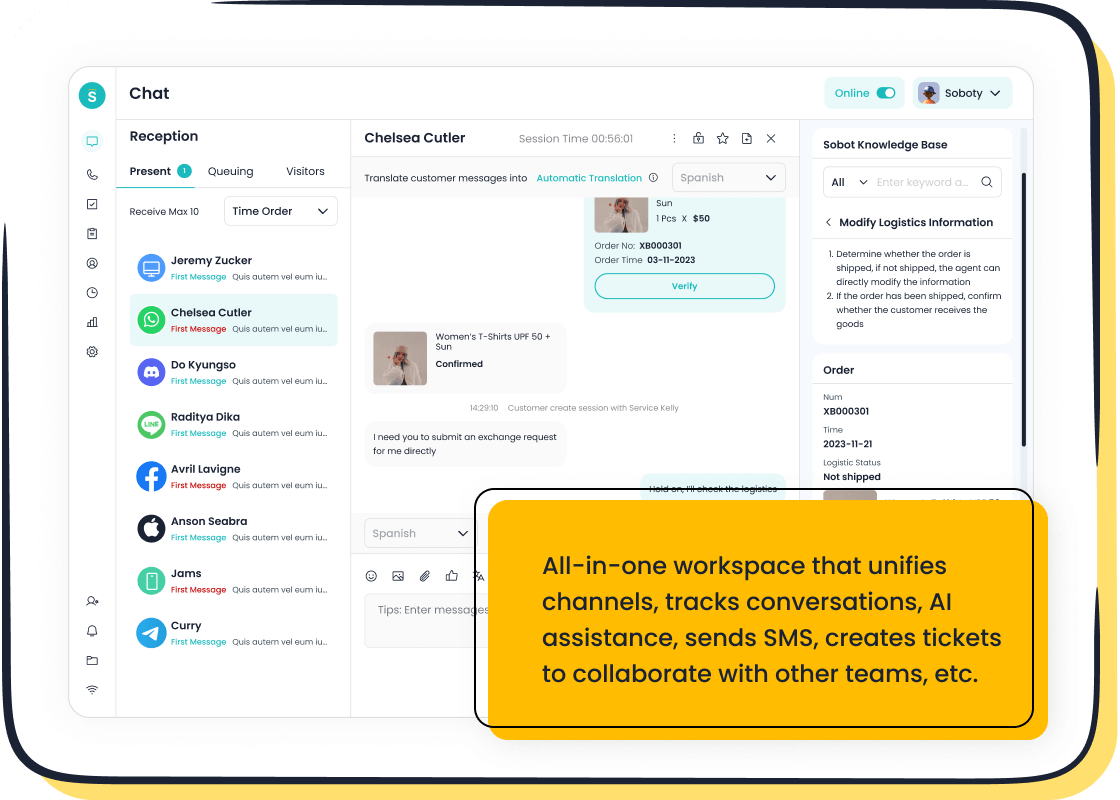
Sobot Live Chat transforms how you interact with your customers by combining advanced AI-driven personalization with seamless communication tools. This platform ensures every interaction feels meaningful, timely, and tailored to individual needs. Here’s how Sobot Live Chat enhances AI-driven customer engagement:
-
Natural Language Processing (NLP) for Accurate Responses
Sobot Live Chat uses advanced NLP to understand and respond to customer queries with precision. This feature ensures that your customers receive accurate and context-aware answers, improving their overall experience. For example, when a customer asks about product availability, the chatbot can instantly provide relevant details without requiring human intervention. -
Machine Learning for Continuous Improvement
The platform incorporates machine learning algorithms that learn from past interactions. Over time, this improves the chatbot's ability to handle complex queries, making your customer service more efficient and reliable. This continuous improvement ensures that your customers always receive the best possible support. -
Seamless Transition Between Chatbots and Agents
Sobot Live Chat bridges the gap between automated and human support. When a query becomes too complex for the chatbot, it seamlessly transfers the conversation to a live agent. This ensures that your customers never feel stuck or frustrated, as they always have access to the help they need. -
Proactive Engagement with Triggered Messages
The platform enables proactive customer engagement by sending triggered messages based on user behavior. For instance, if a customer lingers on a product page, Sobot Live Chat can initiate a conversation to offer assistance or recommend similar products. This approach not only enhances engagement but also boosts conversion rates. -
Multi-Language Support for a Global Audience
Sobot Live Chat supports multiple languages, making it ideal for businesses with a global customer base. Whether your customers speak English, Spanish, or Mandarin, the platform ensures they receive personalized support in their preferred language. This feature helps you build stronger connections with diverse audiences. -
Comprehensive Analytics for Data-Driven Decisions
The platform includes a powerful analytics dashboard that tracks customer interactions and performance metrics. You can monitor key indicators like response times, satisfaction rates, and engagement levels. These insights help you refine your strategies and deliver even better experiences. -
Sentiment Analysis for Prioritizing Urgent Cases
Sobot Live Chat uses sentiment analysis to gauge customer emotions during interactions. If a customer expresses frustration, the system prioritizes their case, ensuring they receive immediate attention. This feature helps you address issues before they escalate, improving satisfaction and loyalty.
By integrating these features, Sobot Live Chat empowers you to deliver AI-driven personalization at scale. It simplifies complex processes, enhances engagement, and ensures your customers feel valued. Businesses using Sobot Live Chat have reported significant improvements in customer satisfaction and operational efficiency. For example, Michael Kors achieved a 95% satisfaction rate and reduced response times by 83% after implementing Sobot’s solutions. These results demonstrate the platform’s ability to revolutionize customer engagement.
Tip: Start with Sobot Live Chat’s free trial to experience its benefits firsthand. Visit Sobot Live Chat to learn more.
Benefits of AI-Driven Personalization in Customer Service
Improved Customer Satisfaction and Loyalty
AI-driven personalization significantly enhances customer satisfaction and loyalty by creating experiences tailored to individual preferences. When customers feel understood, they are more likely to engage with your brand and remain loyal. For instance, 77% of consumers are more inclined to choose, recommend, or even pay extra for personalized experiences. Additionally, 46% of customers make additional purchases when they receive personalized services.
AI tools analyze customer data to deliver personalized recommendations, ensuring every interaction feels relevant. This approach not only improves satisfaction but also fosters emotional loyalty. Businesses that excel in personalization often see a 20% improvement in customer satisfaction, as AI enables them to anticipate needs and provide proactive solutions.
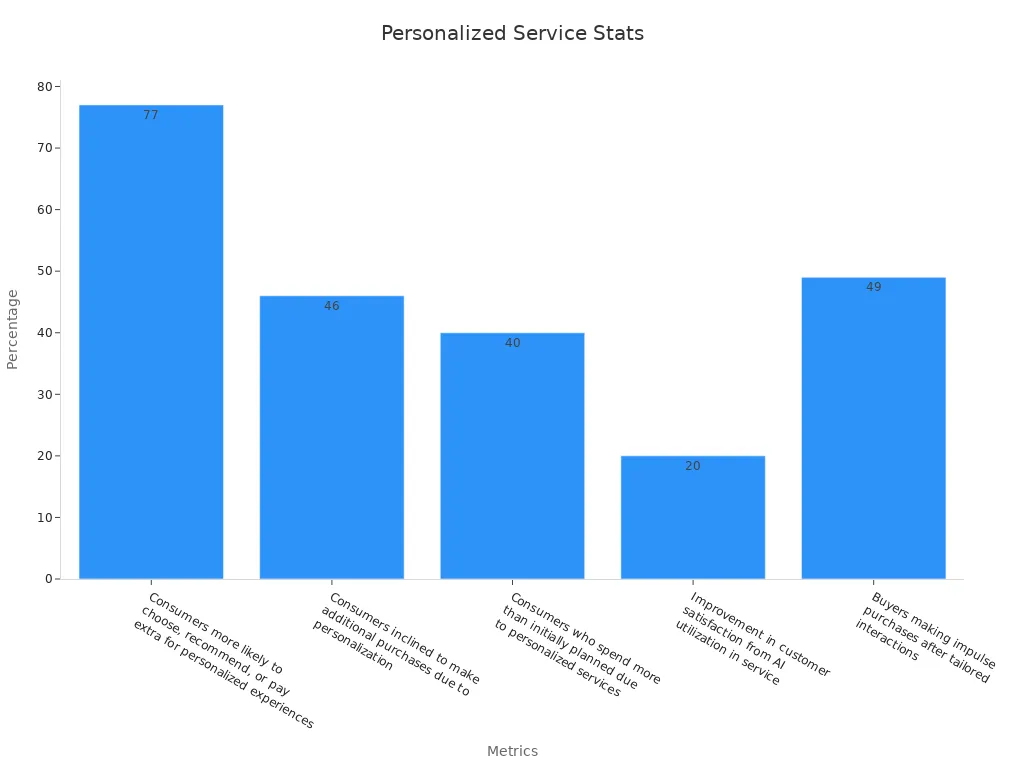
Faster Issue Resolution and Operational Efficiency
AI-driven personalization streamlines issue resolution and boosts operational efficiency. By automating repetitive tasks and providing real-time insights, AI reduces the workload on customer service teams. Metrics like First-Contact Resolution (FCR) and Customer Effort Score (CES) highlight how AI enhances service quality. For example, AI tools improve FCR by equipping agents with relevant information before interactions begin, ensuring faster resolutions.
The following table outlines key performance metrics improved by AI-driven personalization:
| Metric | Definition | Importance |
|---|---|---|
| First-Contact Resolution (FCR) | Percentage of inquiries resolved during the first interaction. | Correlates with customer satisfaction and operational efficiency; AI enhances FCR with insights. |
| Customer Effort Score (CES) | Measure of customer effort to resolve an issue. | AI reduces customer effort, leading to smoother journeys. |
| Predictive Resolution Accuracy | Percentage of cases where AI predicts customer needs before they state it. | Highlights proactive service and effectiveness of AI models. |
AI also optimizes cost-to-serve by automating help-desk support tickets and enabling self-service tools. These efficiencies allow your team to focus on complex issues, improving both productivity and customer satisfaction.
Enhanced Customer Engagement with Tailored Interactions
Personalized interactions drive deeper customer engagement. AI technologies, such as machine learning and data analytics, analyze customer data to deliver tailored experiences. For example, AI can recommend products based on browsing history or send targeted marketing messages that resonate with individual preferences.
The table below highlights how personalization enhances engagement:
| Benefit | Description |
|---|---|
| Tailored Product Recommendations | AI suggests products based on customer preferences, increasing relevance and engagement. |
| Targeted Marketing Campaigns | Personalized campaigns create meaningful connections, boosting customer interest. |
| Improved User Experience | AI-driven personalization ensures interactions feel intuitive and engaging. |
By leveraging AI-driven personalization, businesses can create meaningful connections that keep customers coming back. This approach not only enhances engagement but also increases revenue, as customers are more likely to make impulse purchases after tailored interactions.
How Sobot's AI solutions drive business growth.
Sobot's AI solutions empower businesses to achieve remarkable growth by enhancing operational efficiency, improving customer satisfaction, and driving repeat purchases. By leveraging advanced AI-driven personalization, Sobot enables companies to deliver tailored experiences that resonate with customers and foster loyalty.
Key Business Growth Metrics
Sobot’s AI tools streamline operations and reduce costs while improving customer engagement. The following table highlights the measurable impact of Sobot’s solutions:
| Statistic Description | Value/Impact |
|---|---|
| Reduction in resolution time | Up to 50% reduction through automation |
| Operational cost savings | Up to 68% decrease in staffing needs |
| Increased repeat purchases | 36% increase in repeat purchases |
| Positive customer feedback | 80% of customers reported positive experiences |
| Efficiency in handling complex cases | 80% of inquiries handled autonomously |
| Projected AI handling of customer interactions | 95% of all interactions by 2025 |
| Generative AI adoption prediction | 80% of organizations to integrate generative AI |
| Waiting time reduction in customer management | 35% reduction in waiting time |
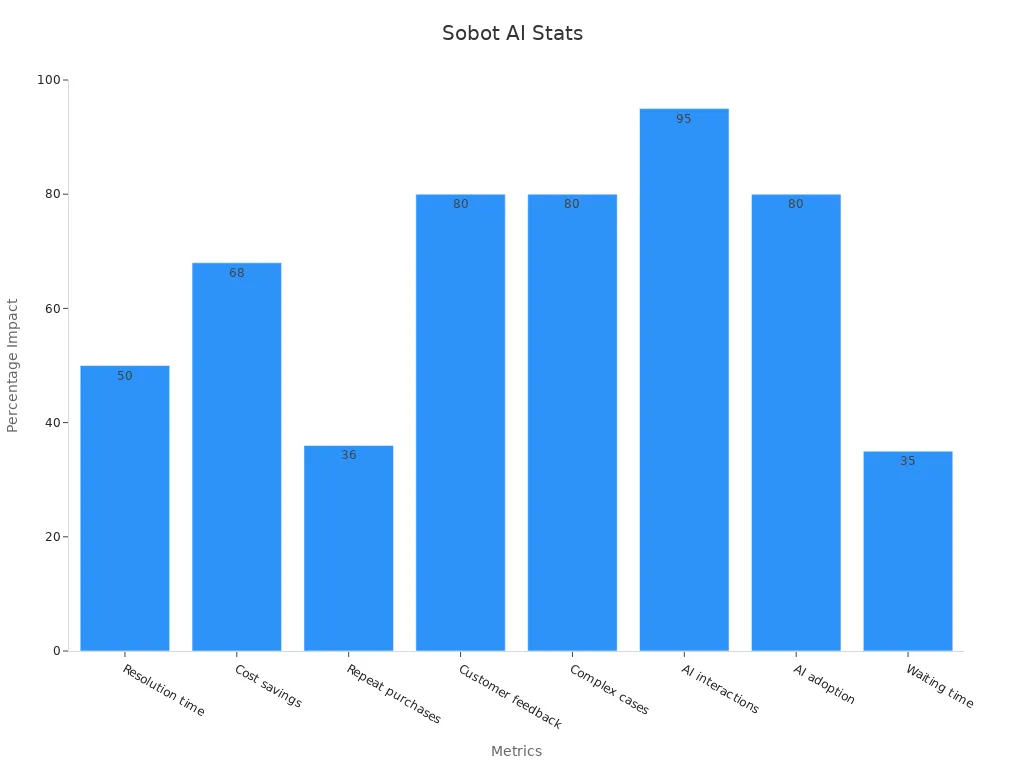
Real-World Impact
A major fresh food e-commerce client integrated Sobot’s open API for call center and ticketing management. This implementation reduced waiting times by 35%, enabling faster customer resolutions and boosting satisfaction. Additionally, Sobot’s AI-driven customer engagement tools helped Michael Kors achieve a 95% satisfaction rate and an 83% reduction in response times, demonstrating the platform’s ability to transform customer service into a growth driver.
AI-Powered Personalization for Repeat Purchases
Sobot’s AI analyzes customer data to deliver personalized recommendations, increasing the likelihood of repeat purchases. Businesses using Sobot’s solutions report a 36% rise in repeat transactions, as customers feel valued and understood. This personalization not only enhances customer satisfaction but also extends the customer lifecycle, driving long-term revenue growth.
Tip: Sobot’s AI solutions are designed to scale with your business, ensuring consistent performance as your customer base grows. Explore Sobot AI to learn more.
By integrating Sobot’s AI tools, businesses can reduce costs, improve efficiency, and create meaningful customer experiences. These solutions position companies to thrive in competitive markets while meeting the growing demand for personalized interactions.
Real-World Applications of AI-Driven Personalization

AI-powered Chatbots and Virtual Assistants
AI-powered chatbots and virtual assistants revolutionize how you interact with customers. These tools provide instant, accurate responses, ensuring faster resolutions and higher satisfaction. For example, AI chatbots can handle up to 5,000 queries per second, reducing response times by 99%. This efficiency allows your team to focus on complex issues, improving overall productivity.
The benefits of AI-driven customer engagement through chatbots are immense:
- 92% of customers report satisfaction after using live chat.
- Businesses save up to $8 billion annually by automating customer support.
- Engagement rates increase by 80%, boosting customer loyalty.
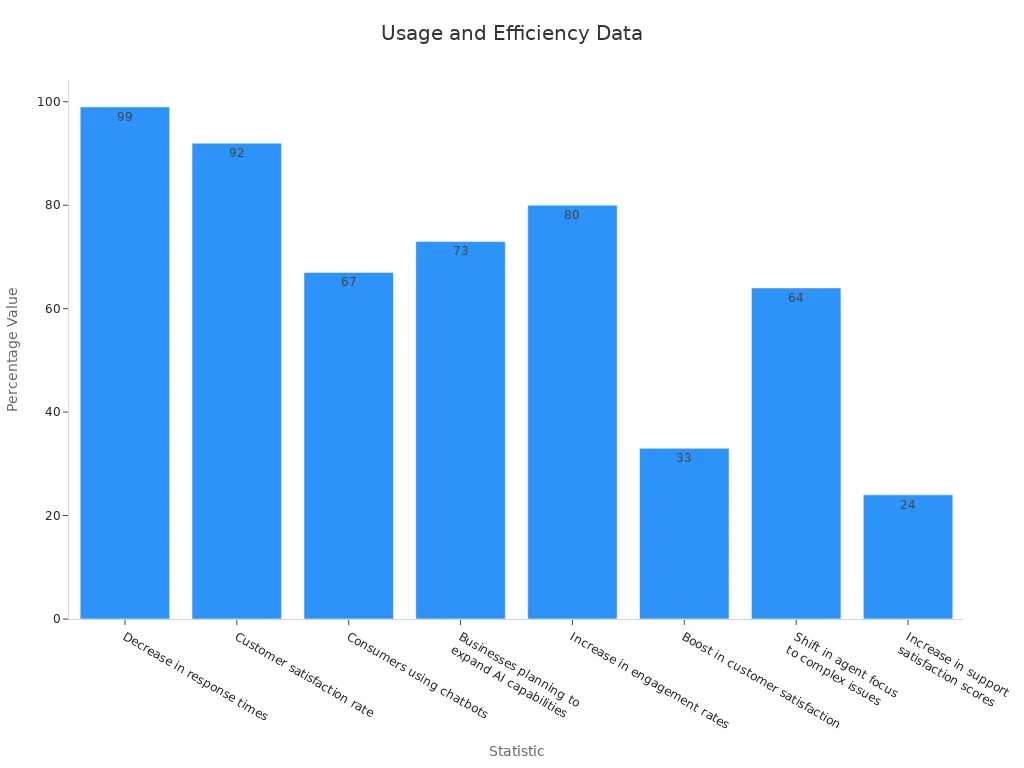
Sobot’s AI-powered chatbots enhance customer engagement by using natural language processing (NLP) to understand and respond to queries. They also integrate seamlessly with live agents, ensuring a smooth transition when human intervention is needed. This approach ensures your customers always receive the best support.
Personalized Product Recommendations and Marketing
AI-driven personalization transforms marketing by delivering tailored product recommendations. AI analyzes browsing history, purchase patterns, and preferences to suggest items that match customer interests. This strategy not only improves the shopping experience but also drives sales. Personalized recommendations account for up to 31% of eCommerce revenues, with conversion rates increasing by 288% after the first interaction.
| Metric | Statistic |
|---|---|
| Average Order Value (AOV) | Increases by 369% with engagement |
| Revenue from Recommendations | Up to 31% of eCommerce revenues |
| Average Sales from Recommendations | 12% of total sales attributed |
| Conversion Rate Increase | 288% after first interaction |
| Cart Abandonment Reduction | Up to 4.35% improvement |
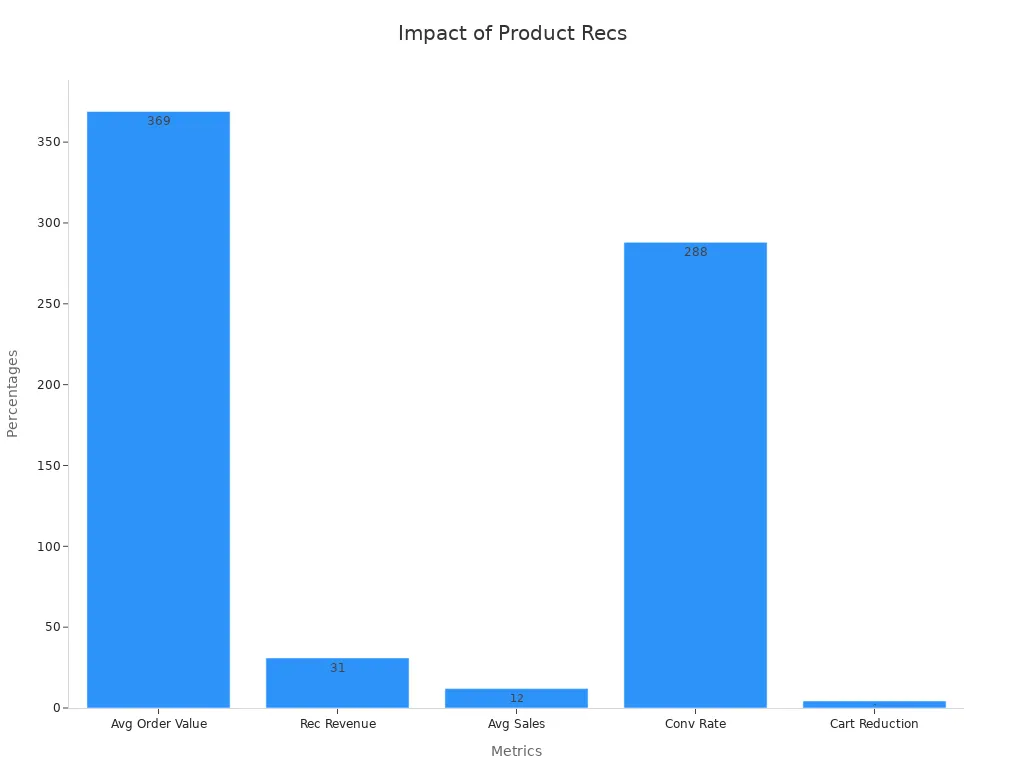
Sobot’s AI solutions empower businesses to deliver these personalized experiences. By analyzing customer data, Sobot helps you create targeted campaigns that resonate with your audience. This approach reduces cart abandonment and increases repeat purchases, driving long-term growth.
Tailored Customer Support Experiences with Sobot Live Chat
Sobot Live Chat takes AI-driven personalization to the next level by offering tailored customer support. The platform uses AI to analyze customer behavior and provide real-time insights, ensuring every interaction feels meaningful. For example, Sobot Live Chat’s sentiment analysis prioritizes urgent cases, improving satisfaction rates.
Key performance metrics highlight its success:
- 57% increase in repurchase rates.
- 83% chatbot resolution rate.
Sobot Live Chat also supports multiple languages, making it ideal for global businesses. Its built-in analytics help you track performance and refine strategies, ensuring continuous improvement. By integrating Sobot Live Chat, you can enhance customer engagement and foster loyalty.
Case study: Michael Kors' success with Sobot's solutions.
Michael Kors, a global luxury fashion brand, transformed its customer service and marketing strategies with Sobot's AI-driven personalization tools. By adopting Sobot's solutions, the brand achieved remarkable improvements in customer engagement, operational efficiency, and overall satisfaction.
Challenges Faced by Michael Kors
Before implementing Sobot, Michael Kors struggled with:
- Long response times that frustrated customers.
- Inefficient communication channels that slowed operations.
- Limited ability to provide personalized customer experiences.
These challenges hindered their ability to meet the high expectations of their global clientele.
Sobot's Solution
Sobot provided Michael Kors with an all-in-one platform that unified customer communication channels, including phone, live chat, and social media. The integration of Sobot Live Chat and WhatsApp API allowed the brand to:
- Deliver personalized support by leveraging AI-driven insights.
- Automate repetitive tasks, freeing agents to focus on complex issues.
- Provide seamless transitions between chatbots and human agents.
Example: Sobot Live Chat’s sentiment analysis prioritized urgent cases, ensuring faster resolutions for frustrated customers.
Results Achieved
The impact of Sobot's solutions was significant. Michael Kors reported:
- 83% reduction in response times, improving customer satisfaction.
- 95% customer satisfaction rate, reflecting the success of personalized interactions.
- 20% increase in conversion rates, driven by targeted marketing through WhatsApp API.
| Metric | Improvement Achieved |
|---|---|
| Response Time Reduction | 83% |
| Customer Satisfaction Rate | 95% |
| Conversion Rate Increase | 20% |
These results highlight how Sobot's AI-driven personalization tools helped Michael Kors exceed customer expectations and drive business growth.
Tip: You can achieve similar results by integrating Sobot Live Chat into your customer service strategy. Start your free trial today at Sobot Live Chat.
Challenges and Solutions in AI-Driven Personalization
Addressing Data Privacy and Security Concerns
AI-driven personalization relies heavily on customer data, making privacy and security critical concerns. Many organizations face challenges in protecting sensitive information while delivering personalized experiences. For instance, 40% of companies have experienced AI-related privacy breaches, and 57% of global consumers view AI data collection as a significant threat to their privacy. These statistics highlight the importance of robust data protection measures.
| Statistic | Source |
|---|---|
| 40% of organizations have experienced an AI privacy breach. | Gartner |
| 57% of global consumers view the use of AI in collecting personal data as a significant threat to their privacy. | International Association of Privacy Professionals |
| 70% of US adults say they have little to no trust in companies regarding AI use. | Pew Research Center |
| 91% of organizations feel they need to reassure customers about AI data usage. | Cisco |
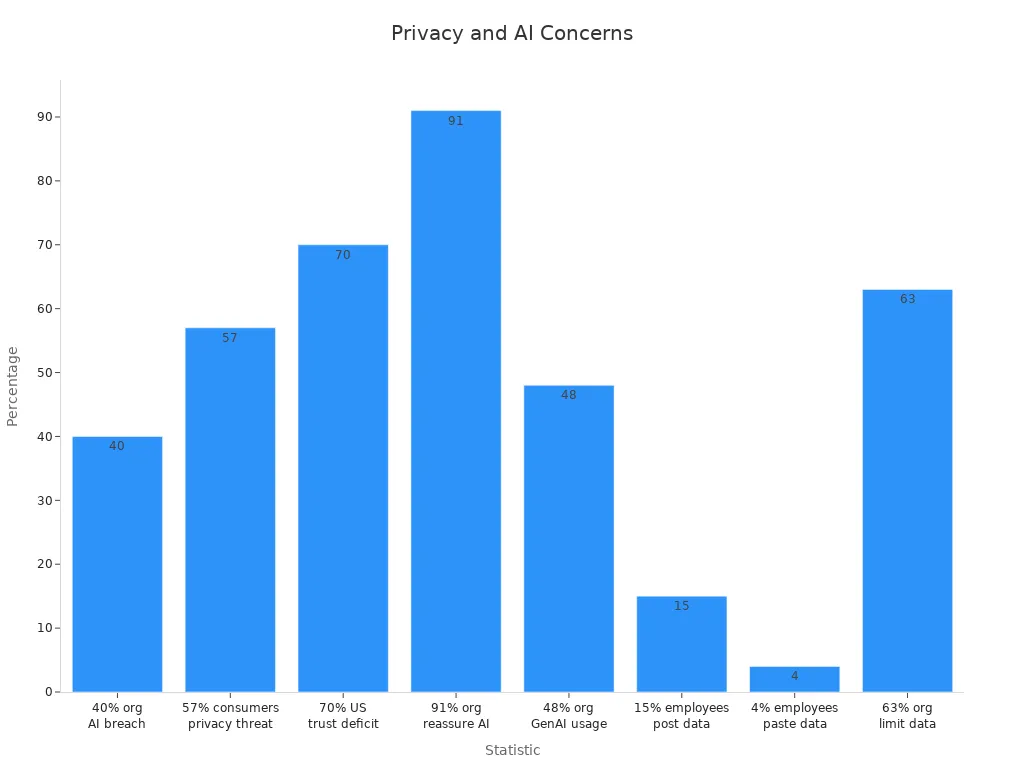
To address these concerns, you should implement encryption, limit data access, and comply with privacy regulations like GDPR. Transparency about how you use customer data can also build trust. For example, 69% of consumers appreciate personalization when it is based on data they willingly share.
Ensuring Algorithm Accuracy and Fairness
AI algorithms must deliver accurate and fair results to ensure equitable customer experiences. However, biases in data or model training can lead to unfair outcomes. You can mitigate these risks by using fairness-aware training algorithms that penalize biased predictions. Data augmentation also helps address imbalances, ensuring your AI models perform well across diverse customer groups.
Key performance metrics for assessing algorithm accuracy and fairness include:
- Error Rate: Measures the percentage of incorrect outputs.
- F1 Score: Combines precision and recall to evaluate model performance.
- Fairness Metrics: Ensures equitable benefits across demographic groups.
By regularly monitoring these metrics, you can identify and correct biases, improving the overall effectiveness of your AI systems.
Avoiding Over-Personalization and Maintaining Balance
Over-personalization can alienate customers and raise privacy concerns. For example, excessive use of personal data may lead to mistrust, as 70% of US adults express little confidence in companies' AI practices. Striking the right balance is essential to avoid these pitfalls.
You can maintain balance by:
- Gathering only the data necessary for personalization.
- Being transparent about how you use customer information.
- Offering customers control over their data preferences.
When done responsibly, personalization enhances customer trust and engagement. Transparency about data usage increases customers' willingness to share information, enabling you to deliver meaningful, tailored experiences without crossing boundaries.
How Sobot ensures compliance and reliability in AI solutions.
Sobot prioritizes compliance and reliability to ensure your business can deliver secure and trustworthy customer service. Its AI solutions are designed to meet stringent data protection standards while maintaining operational efficiency. By integrating advanced security protocols, Sobot helps you safeguard sensitive customer information and comply with global regulations.
Key Metrics Validating Sobot’s Compliance
Sobot’s commitment to compliance is backed by measurable results. The following table highlights essential metrics that demonstrate its reliability:
| Metric | Value |
|---|---|
| Percentage of call centers preferring on-premise software for security | 57.8% |
| Call centers complying with GDPR and data privacy laws | 80% |
| AI tools detecting policy violations in real time | 100% |
| Call centers employing encryption protocols | 70% |
| Large enterprises with compliant call recording retention policies | 95% |
These metrics reflect Sobot’s ability to provide secure AI solutions that align with industry standards. For example, its AI tools detect policy violations instantly, ensuring your operations remain compliant without manual intervention.

How Sobot’s AI Solutions Enhance Reliability
Sobot employs encryption protocols to protect customer data during interactions. Its AI-driven tools analyze communication patterns to identify potential risks, ensuring your systems remain secure. For instance, Sobot’s compliance with GDPR guarantees that your customer data is handled responsibly, building trust with your audience.
Sobot also supports large enterprises with compliant call recording retention policies. This feature ensures your business can store and retrieve customer interactions securely, meeting legal requirements. By automating these processes, Sobot reduces the risk of human error and enhances operational reliability.
Tip: Transparency is key to building trust. Sobot’s solutions allow you to share clear data usage policies with your customers, reassuring them about the safety of their information.
Sobot’s focus on compliance and reliability empowers your business to deliver personalized customer service without compromising security. Its AI solutions provide the foundation for scalable, secure, and efficient operations, helping you stay ahead in competitive markets.
The Future of AI-Driven Personalization in Customer Service
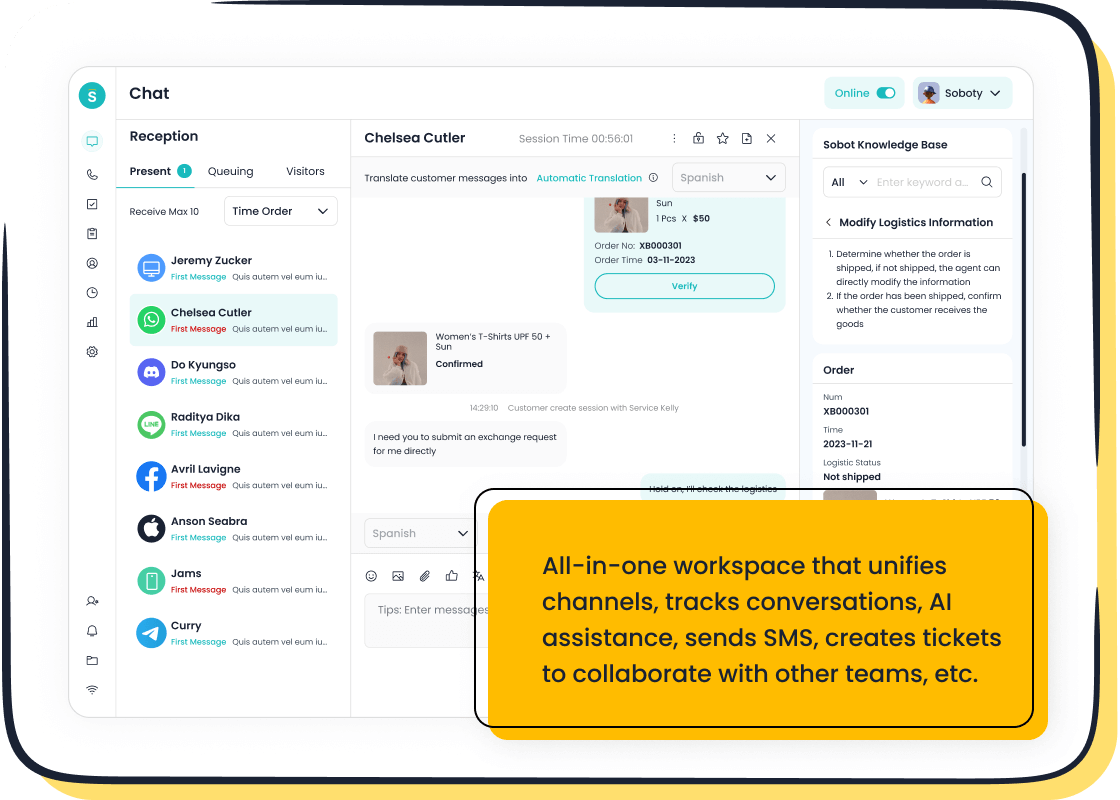
Emerging Trends in AI-Driven Customer Engagement
AI-driven customer engagement is evolving rapidly, with businesses adopting innovative tools to enhance personalization. Sentiment analysis is gaining popularity, allowing companies to tailor interactions based on customer emotions. For example, AI can detect frustration in a customer’s tone and prioritize their case for immediate resolution. This trend ensures faster responses and higher satisfaction.
Another emerging trend is the expansion of AI in customer experience. Over 65% of businesses plan to increase their use of AI within the next year. This growth reflects the rising confidence in AI’s ability to meet customer expectations. Additionally, the AI market is projected to grow from $214 billion in 2024 to $1,339 billion by 2030, highlighting its transformative potential.
| Trend | Description |
|---|---|
| AI Expansion | 65% of businesses intend to expand AI in customer experience over the next year. |
| Sentiment Analysis | AI tools for sentiment analysis are becoming popular, helping to tailor customer interactions. |
These trends demonstrate how AI is reshaping customer engagement, making interactions more personalized and efficient.
The Growing Role of AI in Omnichannel Customer Service
AI plays a crucial role in enabling omnichannel personalization, ensuring seamless customer experiences across multiple platforms. It processes data from diverse channels, such as social media, email, and live chat, to create unified insights. For example, AI algorithms clean and categorize customer feedback, removing redundancies to highlight key issues. This process enhances service strategies and improves customer satisfaction.
| Process | Description |
|---|---|
| Data Processing | Involves cleaning, categorizing, and removing redundancies from customer feedback to highlight key issues. |
| Normalization | Standardizes diverse data formats from multiple channels to ensure accurate comparisons and analyses. |
| Insight Extraction | AI algorithms analyze processed data to identify actionable insights, enhancing customer experience. |
AI also enables intelligent chatbots, voice recognition systems, and predictive assistance. These tools anticipate customer needs and provide tailored solutions, ensuring consistent service across all channels. For instance, Amazon’s AI-driven recommendation engine showcases the effectiveness of these technologies in enhancing omnichannel strategies.
Predictions for the Next Decade of AI-Driven Personalization
The next decade will witness transformative advancements in AI-driven personalization. Predictive models, such as neural networks and decision trees, will empower businesses to forecast customer behavior and optimize marketing strategies. For example, time series forecasting will help companies anticipate seasonal sales trends and adjust their campaigns accordingly.
| Model Type | Purpose |
|---|---|
| Neural Networks | Handles complex predictions by mimicking human brain structure and function. |
| Decision Trees | Identifies high-value customer segments through branching decision paths. |
| Time Series Forecasting | Anticipates seasonal sales trends to adjust marketing strategies. |
Predictive AI will become a cornerstone of marketing, blending human creativity with machine intelligence to deliver personalized campaigns. As businesses embrace these technologies, they will create more meaningful connections with customers, driving loyalty and growth.
Tip: Stay ahead by integrating AI tools that combine predictive analytics with real-time personalization. This approach ensures your strategies remain effective in a competitive landscape.
AI-driven personalization has revolutionized customer service by transforming how businesses interact with their customers. It enables tailored experiences that improve satisfaction, loyalty, and operational efficiency. For example, hyper-personalization can drive up to 40% revenue growth, while abandoned cart recovery rates reach 25%. Companies like Vodafone and Alibaba have seen significant gains, including a 70% first-time fix rate and a 20% increase in average order value, respectively.
Sobot empowers businesses to deliver these results through its innovative solutions, such as Live Chat and AI tools. By leveraging Sobot’s technology, you can enhance customer experience, reduce costs, and achieve higher conversion rates. The platform’s ability to unify communication channels and provide real-time insights ensures your customers feel valued and understood.
Tip: Adopting AI-driven personalization positions your business to thrive in competitive markets. Start exploring solutions like Sobot to stay ahead of evolving customer expectations.
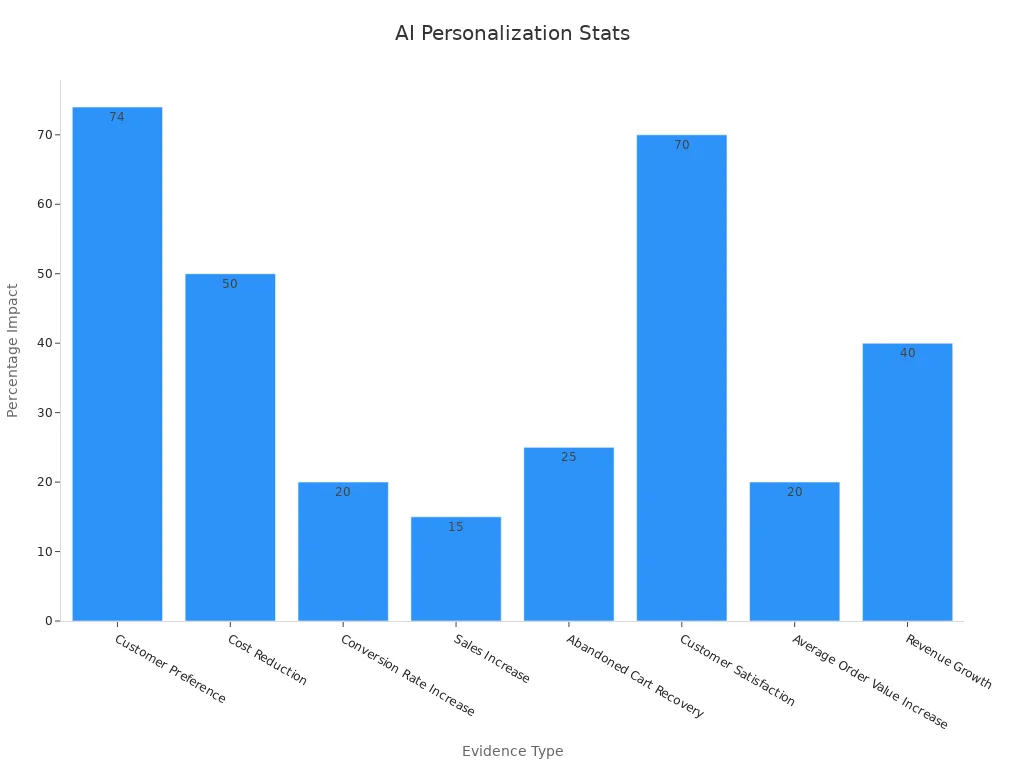
FAQ
1. How does AI-driven personalization improve customer service?
AI analyzes customer data to understand preferences and behaviors. It delivers tailored experiences, such as personalized recommendations or proactive support. This approach enhances satisfaction, builds loyalty, and simplifies interactions.
2. Is AI-driven personalization suitable for small businesses?
Yes, AI tools like Sobot Live Chat scale to fit businesses of all sizes. They automate tasks, reduce costs, and improve customer engagement, making them ideal for small businesses seeking efficiency.
3. What types of data does AI use for personalization?
AI uses purchase history, browsing patterns, feedback, and engagement metrics. It combines these insights to predict customer needs and deliver relevant solutions.
4. Can AI-driven personalization work across multiple channels?
Absolutely! AI integrates with websites, apps, and social media platforms. Tools like Sobot Live Chat unify communication channels, ensuring seamless customer experiences.
5. How can I start using AI-driven personalization in my business?
Begin by identifying customer touchpoints and integrating AI tools like Sobot Live Chat. Use its free trial to explore features like real-time personalization and analytics. Visit Sobot Live Chat for more details.
See Also
Transforming Support With AI-Powered Customer Service Agents
Enhancing Efficiency Through AI Customer Service Solutions
Increasing Customer Satisfaction With E-commerce Chatbots
